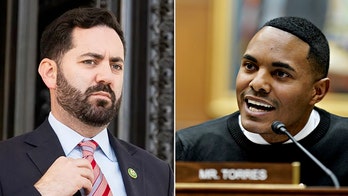President Obama said he would veto any effort by lawmakers to repeal a requirement for $1 trillion in automatic spending cuts to be triggered after the Super Committee failed to agree on terms to save the country $1.2 trillion over a 10-year span.
“There will be no easy off ramps on this one,” Obama said at an afternoon press conference where he laid blame squarely on Republicans who refused to bend in their defense of tax cuts for the wealthy during debt talks. “We need to keep the pressure up to compromise, not turn off the pressure.”
He went on to promise that the deficit will be reduced by at least $2.2 trillion in the next decade “one way or another.” He included the roughly $1 trillion in cuts approved in August.
"The only way these spending cuts will not take place is if Congress gets back to work to reduce the deficit by at least $1.2 trillion," he said. "They've still got a year to figure it out."
These automatic spending cuts are designed to fall evenly on the military and domestic government programs beginning in 2013.
Defense Secretary Leon Panetta as well as lawmakers in both parties have warned the impact on the Pentagon could be devastating.
"In my four decades involved with public service, I have never been more concerned about the ability of Congress to forge common-sense solutions to the nation's pressing problems," Panetta, a former House budget committee chairman, said in a statement.
Sens. John McCain, R-Ariz., and Lindsey Graham, R-S.C., issued a statement about the mandatory cuts to defense, calling the sequester of $600 billion in defense spending a “threat to the national security interests of the United States and cannot be allowed to occur.”
After months of talks, the Super Committee announced it was unable to agree on terms to save $1.2 trillion over 10 years by tonight's midnight deadline.
"Despite our inability to bridge the committee's significant differences, we end this process united in our belief that the nation's fiscal crisis must be addressed and that we cannot leave it for the next generation to solve," a statement from co-chairs of the committee read.
About a half hour after the committee's announcement, Obama said Republicans were the main stumbling block to reaching agreement on deficit.
"There are still too many Republicans in Congress who have refused to listen to the voices of reason and compromise that are coming from outside of Washington," he said.
The panel had until midnight to come up with a plan for reducing the federal debt by $1.2 trillion over 10 years or face automatic cuts, called "sequestration."
Failure to do so would violate the law that demanded that the Congressional Budget Office come up with a fiscal evaluation of the plan and give Congress two days to review it before the Nov. 23 deadline. The task was supposed to be wrapped up by Dec. 23 with an unamended vote on the package.
Rep. Chris Van Hollen, D-Md., a panel member, called the committee's outcome an "opportunity missed" in a statement.
"Many will portray this failure as the inevitable consequence of two partisan sides refusing to give ground," Van Hollen said, suggesting blame should lie with Republicans. "Blaming both sides equally will be the simple storyline and the path of least resistance."
Sen. Pat Toomey, R-Pa., another panel member, said Republicans offered their colleagues a revenue compromise that Democrats demanded, but he said in a statement that Democrats refused to agree to any meaningful deficit reduction without “$1 trillion in job-crushing tax increases.”
A last-ditch meeting of lawmakers ended Monday afternoon with no smiles, no comments, but some vivid body language. Even a visit to the White House by Sen. Patty Murray, D-Wash., co-chairwoman of the panel of 12 came and went without comment.
For some, the latest news comes as no surprise.
The sequester was designed and voted on by both parties and signed by the president, "specifically to be onerous," said White House spokesman Jay Carney. "It was designed so that it never came to pass."
Lawmakers are looking for alternatives to a plan that is designed to chop equally from domestic and entitlement programs on one end, and defense on the other.
McCain and Graham said they are writing legislation to prevent what they say would be devastating cuts to the military. Democrats maintain they won't let domestic programs be the sole source of savings.
The committee could do its work in halves. For instance, if the panel produces less than $1.2 trillion in savings, automatic cuts are activated to make up the difference. So $800 billion in savings from the Super Committee would trigger $400 billion in automatic cuts.
By law, 18 percent of the automatic savings are assumed to come from interest costs the government would save from reducing the debt. If the Super Committee fails completely, out of the $1.2 trillion in automatic savings, $216 billion would be assumed interest savings.
That would leave $984 billion in automatic spending cuts over 10 years. That works out to around $55 billion annually each from defense and domestic programs though a CBO analysis shows that comes out to 10 percent of the Pentagon budget in 2013 alone, a huge hit.
On the domestic side, the law exempts Social Security, Medicaid and many veterans' benefits and low-income programs. It also limits Medicare to a 2 percent reduction. That leaves education, agriculture and the environment programs exposed to cuts of around 8 percent in 2013, according to the CBO. For many Democrats, those are cuts worth fighting against, especially if Republicans try protecting defense programs.
For those on the outside, failure is not a terrible outcome.
"Ordinary Americans should breathe a sigh of relief because we dodged a bullet," Greenlining Institute General Counsel Samuel S. Kang said in a statement. "We could achieve most of the deficit reduction goal by simply shutting down offshore corporate tax havens ... We should make America's richest companies pay their fair share before even thinking about slashing vital programs."
"Given the alternatives, which were phony spending cuts and higher taxes on producers and job creators, sequestration is by far the better deal," said Americans for Limited Government President Bill Wilson. "There should be no discussion of revenue reform until there are actual spending cuts on the table. All we see now are reductions in the growth of spending. What a farce."
The Associated Press contributed to this report.





